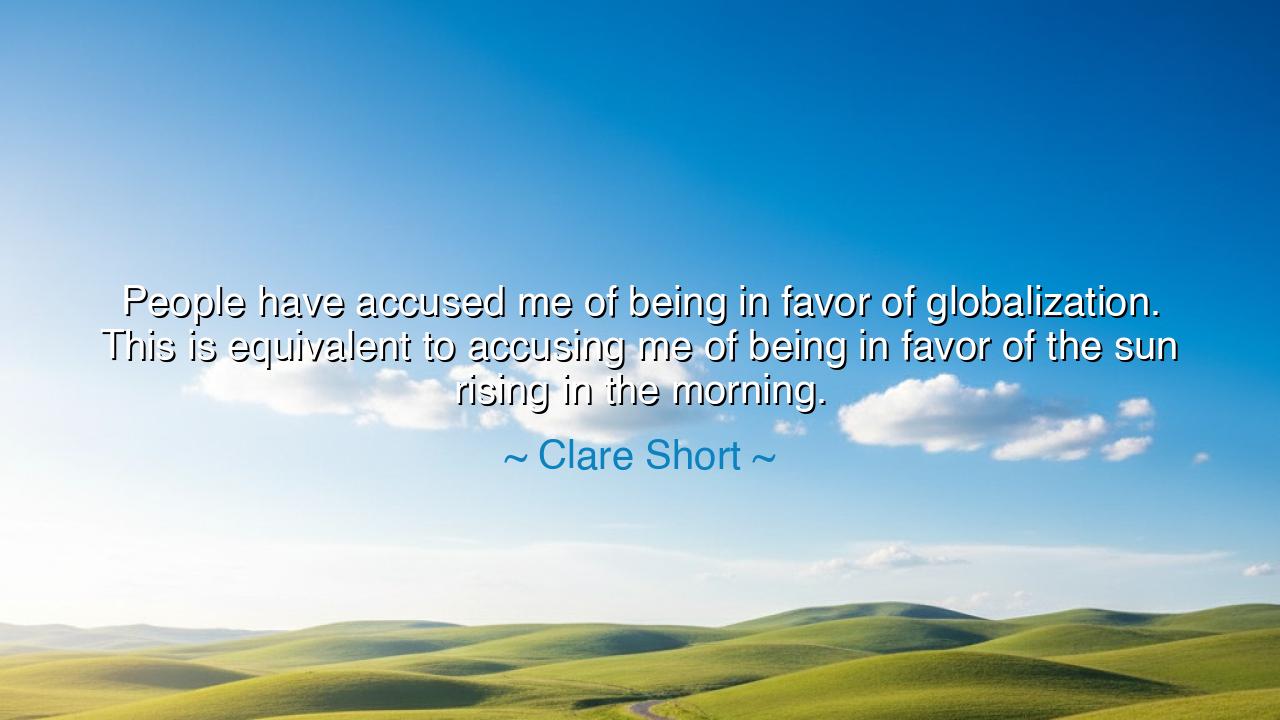
People have accused me of being in favor of globalization. This
People have accused me of being in favor of globalization. This is equivalent to accusing me of being in favor of the sun rising in the morning.






"People have accused me of being in favor of globalization. This is equivalent to accusing me of being in favor of the sun rising in the morning." Thus spoke Clare Short, a voice both fierce and unyielding, who sought to illuminate the nature of forces greater than any individual’s will. These words, at once cutting and serene, reveal a truth that transcends politics: that some tides cannot be held back, some currents cannot be reversed, and some events are as inevitable as the dawn itself. To be “in favor” or “against” such things is folly; they will unfold whether one blesses them or curses them.
To understand the sun rising in the morning is to understand inevitability. The sun does not ask permission to climb the sky, nor does it wait for the approval of kings or the applause of the people. It rises because it must, because it is woven into the order of the cosmos. In likening globalization to the sun, Short places it in the realm of unstoppable forces. It is the weaving together of nations, the entangling of economies, the mingling of cultures—born not from human decree alone, but from the deep necessities of trade, technology, and time.
History offers us a mirror in the voyages of the Age of Exploration. When caravels crossed the seas, when Columbus touched the Americas, when Vasco da Gama reached India, the world itself shifted upon its axis. Gold, spices, and silks flowed; diseases spread; cultures collided. Some praised it as opportunity, others decried it as disaster. Yet none could deny it, nor turn the ships back to their ports. Just as Clare Short declares, to accuse one of “favoring” such change is as empty as accusing one of favoring the turning of the earth itself. The ships had sailed, and the world had been bound together forever.
There is sorrow in these words as well as strength. For if such forces are inevitable, then they bring with them not only light but shadow. The rising sun warms the fields, but it also casts harsh heat upon the weary. In the same way, globalization brings wealth to some and poverty to others, opportunity to the quick, despair to the slow. Yet to deny it, to pretend it could be undone, is to live in delusion. The wise do not resist the dawn—they prepare for it, adjusting their labors to the changing light.
Think also of the Roman Empire. Its roads spread across Europe, its laws reached distant lands, its language shaped generations. Some rejoiced at the unity; others mourned the loss of their ways. But whether welcomed or resisted, the empire’s expansion was as relentless as the rising sun. Only later, when its time had ended, did the world see new dawns. The lesson is not whether such tides are “good” or “bad,” but how men and women meet them—with fear and denial, or with courage and adaptation.
The lesson Clare Short offers is this: do not waste energy fighting the inevitable. Instead, turn your strength toward shaping how the inevitable unfolds. You cannot stop the sun, but you can choose whether to till your fields in its light or burn in its glare. You cannot undo globalization, but you can choose to guide it toward justice, fairness, and shared prosperity. To reject inevitability is weakness; to harness it is wisdom.
Practical action, then, is to open one’s eyes to the great movements of our age. Whether in technology, culture, or politics, ask not, “Can I stop this?” but rather, “How can I prepare? How can I shape this power so it does not crush but uplift?” Just as sailors cannot command the wind but may set their sails, so too must we meet the currents of the world with readiness, clarity, and resolve.
Thus the teaching endures: to accuse one of favoring the sun’s rising is to misunderstand the sun itself. The dawn will come regardless. And so it is with the forces that bind humanity ever closer. Fear them not, resist them not, but learn to walk in their light, and in that light build a future worthy of the day.






AAdministratorAdministrator
Welcome, honored guests. Please leave a comment, we will respond soon